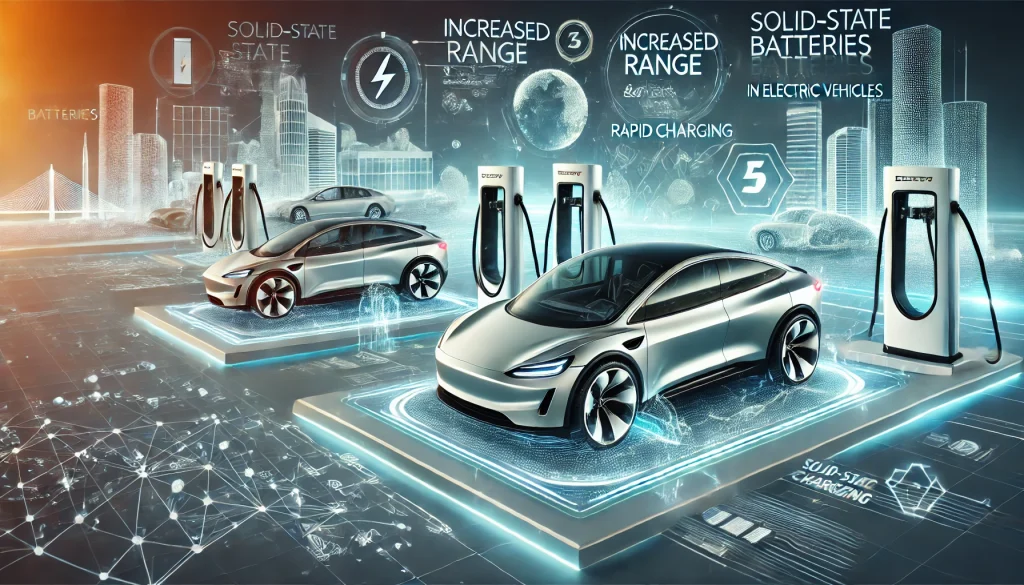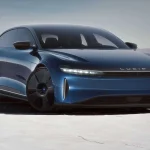The electric vehicle (EV) market is on the cusp of a significant transformation, driven by advancements in battery technology. Among the most promising developments is the rise of solid-state batteries, which could dramatically increase the range of electric vehicles and reduce charging times. As automakers and tech companies invest heavily in this technology, the next few years could see a major shift in how electric vehicles are powered. This article explores the future of solid-state batteries in electric vehicles and how these innovations are set to enhance EV performance by 2025 and beyond.
How Solid-State Batteries Improve Range
One of the most anticipated benefits of solid-state batteries is their potential to increase the range of electric vehicles. Traditional lithium-ion batteries use a liquid electrolyte to transport lithium ions between the anode and cathode. In contrast, solid-state batteries use a solid electrolyte, which allows for higher energy density. This means that more energy can be stored in a smaller and lighter battery pack, resulting in a longer driving range for EVs.
With solid-state batteries, automakers could potentially achieve ranges of 500 miles or more on a single charge, significantly reducing range anxiety—a major concern for many potential EV buyers. The increased energy density also allows for more flexible battery designs, enabling manufacturers to optimize vehicle layouts and further improve efficiency.
Reducing Charging Times with Solid-State Technology
In addition to extending range, solid-state batteries offer the promise of much faster charging times. The solid electrolyte in these batteries can support higher charging currents without the risk of overheating or degradation, which is a limitation in current lithium-ion technology. This could enable electric vehicles to be charged in as little as 10 to 15 minutes, making EVs more convenient for everyday use and long-distance travel.
Fast charging is a crucial factor in the widespread adoption of electric vehicles, as it addresses one of the key drawbacks of current EV technology. As solid-state batteries become more prevalent, the need for extensive charging infrastructure will also grow, leading to more widespread availability of fast-charging stations across highways and urban areas.
Challenges to Overcome
Despite the potential benefits, several challenges remain before solid-state batteries can be widely adopted in electric vehicles. The current manufacturing processes for solid-state batteries are more complex and expensive than those for traditional lithium-ion batteries. Scaling up production to meet the demands of the automotive industry will require significant advancements in materials science and engineering.
Another challenge is ensuring the long-term durability and reliability of solid-state batteries. While they offer higher energy density and faster charging, these batteries must also demonstrate consistent performance over many charge cycles and in various environmental conditions. Researchers are actively working on improving the materials used in solid-state batteries to overcome these challenges and bring the technology closer to commercial viability.
The Road Ahead: 2025 and Beyond
As we look towards 2025, the solid-state battery landscape is expected to evolve rapidly. Major automakers, including Toyota, BMW, and Volkswagen, are investing in solid-state battery research and development, with plans to introduce vehicles powered by this technology within the next few years. Early models may be premium vehicles, given the current costs associated with solid-state batteries, but as production scales and costs decrease, these batteries could become the standard for all EVs.
Beyond 2025, solid-state batteries are likely to play a key role in the broader electrification of transportation. As charging infrastructure improves and battery technology continues to advance, the barriers to EV adoption will continue to fall, making electric vehicles a more attractive option for consumers worldwide.
Conclusion
The future of solid-state batteries in electric vehicles holds great promise for transforming the EV industry. By significantly increasing range and reducing charging times, these advanced batteries could overcome some of the most significant hurdles to widespread EV adoption. While challenges remain in scaling production and ensuring long-term durability, the progress being made in solid-state battery technology suggests that we could see these innovations in mainstream electric vehicles by 2025 and beyond. As the technology matures, solid-state batteries have the potential to revolutionize the way we think about electric mobility and drive the next wave of growth in the EV market.



Solid-state batteries are gonna be a game changer for EVs—longer range, crazy fast charging… just gotta iron out the tech first, so no more “are we there yet?” moments on road trips!
Looks like they’re already hittin’ the streets… and honestly, they might just be goin’ the distance! 😎
Game changer! 🔋🚘 Solid-state batteries = longer range, faster charging. 2025, let’s go! 🚀
seems too good to be true when will they actually work?🤔
solid-state batteries hype tbh idk if worth it👎